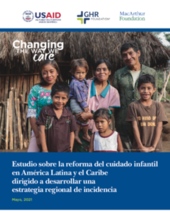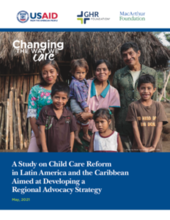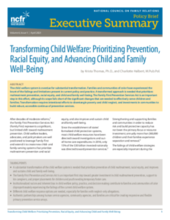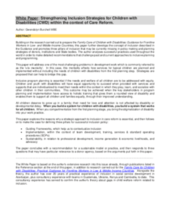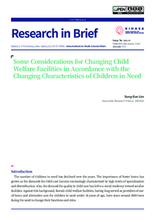Displaying 251 - 260 of 1025
El estudio llevó a cabo un ejercicio de recopilar prácticas prometedoras de reforma de cuidado infantil por parte de diversos actores clave en la región de América Latina y el Caribe.
This study presents a detailed overview of promising practices in child care reform by different implementers and stakeholders in the Latin American and Caribbean region.
This webinar is the second in a series for the Transforming Children's Care Global Collaborative Platform. In the webinar, Philip Goldman from Maestral International presented new guidance on Public Expenditure and Children’s Care produced by Changing the Way We Care, which is designed to strengthen the capacity of government agencies in low resource settings to prepare a sound budgetary framework.
Este seminario web es el segundo de una serie de la Plataforma de colaboración global Transforming Children's Care. En el seminario web, Philip Goldman de Maestral International presentó una nueva guía sobre gasto público y cuidado de los niños producida por Changing the Way We Care, que está diseñada para fortalecer la capacidad de las agencias gubernamentales en países de bajos recursos para preparar un marco presupuestario sólido.
This policy brief presents a list of recommendations for U.S. policymakers to transform the child welfare system by prioritizing maltreatment prevention, racial equity, and child and family well-being.
With millions of children worldwide living in alternative care settings, this article applies the learning from implementation science to advance the sector’s thinking around what needs to be in place to ensure consistently high-quality residential care.
During this webinar, hosted by UNICEF and Better Care Network, Gillian Huebner presented the paper It’s time for care: Prioritizing quality care for children during the COVID-19 pandemic - Challenges, opportunities and an agenda for action. The presentation was followed by a panel discussion featuring panelists from UNICEF Child Protection, Women in Informal Employment: Globalizing and Organizing (WIEGO), UNICEF Office of Research – Innocenti, and the Early Childhood Development Action Network (ECDAN).
This paper will address one of the most challenging problems in development work which is commonly referred to as the ‘silo mentality’. In this case, this mentality affects how services for typical children are planned and implemented without including the needs of children with disabilities from the first planning step. Strategies are proposed that can help to bridge this gap.
UNICEF Bulgaria's project, "Family for Every Child," aimed to demonstrate that viable alternatives to institutionalization exist, and that as long as a network of suitable support services is in place, deinstitutionalization is achievable. UNICEF Bulgaria commissioned this evaluation to establish whether the project had been successful
This brief discusses ways in which the roles and functions of Korea’s child welfare facilities should change to better meet the diverse needs of children in need.

